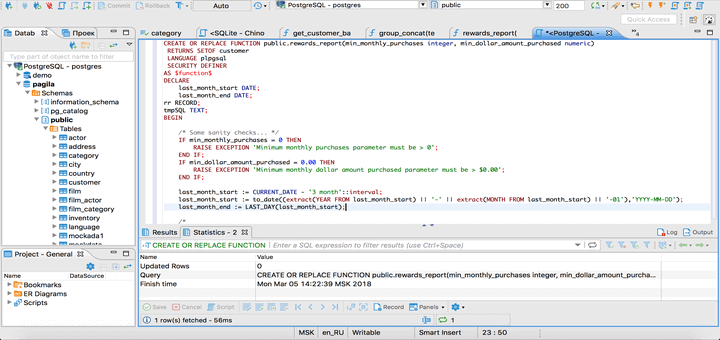

It's about time, dealing with PHP 4 is too complicated for todays WordPress developers. Standard disclaimers apply, verify checksums and the yadda yadda, otherwise, you know, install as root from the internet has never let you down than once.
#UBUNTU INSTALL DBEAVER UPGRADE#
So her is my current state of the one-liner to run the upgrade when I get noticed: $ sudo apt install "./$( And there is an URL redirecting always to the lastest version. DBeaver is java-based universal database tool which supports large variety of database engines such as MySQL, Oracle, SQLite, PostgreSQL, and more by using JDBC driver. It reminds me to Heidi SQL which runs on Windows.
#UBUNTU INSTALL DBEAVER UPDATE#
deb packages, so the package manager can install and update them. DBeaver is my favourite GUI database tool under Ubuntu. It gets updated quite seriously and luckily there are releases with. Do not install over PSQL Vx.PSQL Vx Server 12 SP1 Update - Windows. I recently started to use Dbeaver on my Ubuntu system. Highly recommended as there are updates often, it’s perhaps worth to schedule the downloads in the background as the repository can be slow.
#UBUNTU INSTALL DBEAVER DOWNLOAD#
It’s all on the download page and all you need is to have the patience to scroll down (or Ctrl+F). While it’s fine to have it perhaps for some systems, it is actually the case that Dbeaver has both a Debian repository and an Unbuntu PPA as I just learned: sudo add-apt-repository ppa:serge-rider/dbeaver-ce You can now manage your database, tables, triggers, Procedures, Views, Events e.t.c using DBeaver.Update: Turns out I was too eager to get the command line running.You should now see database created earlier under MariaDB connection profile.

Your connection test should then return a success.When asked to download mariadb connection driver, please agree by clicking Download button. Click “Test Connection” to verify the connection.Provide database access details – Server, database user.Create a new database connection – Specify database type.You can either Launch DBeaver from your terminal or Applications Launcher for your Desktop Environment.Step 4 : Launching DBeaver on Ubuntu / Debian System MariaDB > CREATE DATABASE test_db MariaDB > CREATE USER IDENTIFIED BY ‘StrongPassword’ MariaDB > GRANT ALL PRIVILEGES ON test_db.* TO > FLUSH PRIVILEGES MariaDB > QUIT Type ‘c’ to clear the current input statement. Commands end with or g.Your MariaDB connection id is 48Server version: 10.3.11-MariaDB-1:10.3.11+maria~bionic-log binary distributionĬopyright (c) 2000, 2018, Oracle, MariaDB Corporation Ab and others. $ mysql -u root -pEnter password:Welcome to the MariaDB monitor. Once you have a database server, log in to MySQL shell as root user and create a test database to connect from DBeaver Database tool. For this demonstration, we’ll use the MariaDB database server. This build process is relatively complicated (and also consists of two parts). It is written in TypeScript and JavaScript. It is written in Java and reuses 'platform' libraries of DBeaver. It consists of two parts: Server back-end. Before launching and configuring DBeaver service, you may first need to create a database and database user to connect to. CloudBeaver is a web server which provides a rich web interface.Install DBeaver version can be checked using:.Sudo apt updatesudo apt install dbeaver-ce After adding the repo, update the apt list and install DBeaver CE: Example 1: apt update dbeaver sudo add-apt-repository ppa:serge-rider/dbeaver-ce sudo apt-get update sudo apt-get install dbeaver-ce Example 2: dbeaver.Wget -O – | sudo apt-key add –echo “deb /” | sudo tee /etc/apt//dbeaver.list Add DBeaver repository to your Debian / Ubuntu by running the commands below:.Step 2 : Add Debian repository and install DBeaver CE $ java -versionopenjdk version “11.0.11” OpenJDK Runtime Environment (build 11.0.11+9-Ubuntu-0ubuntu2.20.04)OpenJDK 64-Bit Server VM (build 11.0.11+9-Ubuntu-0ubuntu2.20.04, mixed mode, sharing) Sudo apt updatesudo apt -y install default-jdk Run the following commands to have Java installed and set as default Java on your Ubuntu 22.04|20.04|18.04|16.04. OpenJDK is the default Java development and runtime available on Debian repository.


 0 kommentar(er)
0 kommentar(er)
